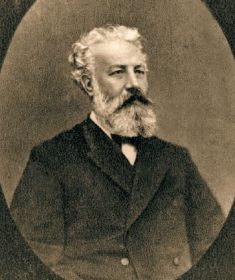In the mid to late 19th century, Jules Gabriel Verne brought to the world an innovative approach to writing that was adventurous and romantic, yet scientifically sound. As the author of more than 60 novels, nearly 20 short stories, 30 plays, and various geographical works and opera librettos, Verne, along with H. G. Wells, is rightly credited as being a founding father of science fiction.
Born in the coastal town of Nantes, France, in 1828, Verne was heavily influenced in life by a family tradition of seafaring. He went so far as to run off to be a cabin boy on a merchant ship, but was returned to his parents who sent him to study law in Paris in 1847. While in Paris he became enthralled with the theater and began writing plays, the first of which was published in 1850. His father, who was extremely displeased with Verne’s decision because of his desire for him to continue his study of law, subsequently cut off his financial support. As a result, Verne began selling his stories to make ends meet.
 While in Paris, Verne married and gained two stepdaughters whom he also needed to support. He thus continued to write and research a variety of subjects including engineering, astronomy, and geology. His first novel Five Weeks in a Balloon reflected the fruits of his labor and led to a series of well-received books including A Journey to the Center of the Earth (1864) and 20,000 Leagues Under the Sea (1870). It was not until he published Around the World in Eighty Days (1873), however, that he became a major success. The book was extremely popular and published in several languages. He continued writing and in the mid-1870s, a stage play was made of Around the World in Eighty Days that became hugely successful.
While in Paris, Verne married and gained two stepdaughters whom he also needed to support. He thus continued to write and research a variety of subjects including engineering, astronomy, and geology. His first novel Five Weeks in a Balloon reflected the fruits of his labor and led to a series of well-received books including A Journey to the Center of the Earth (1864) and 20,000 Leagues Under the Sea (1870). It was not until he published Around the World in Eighty Days (1873), however, that he became a major success. The book was extremely popular and published in several languages. He continued writing and in the mid-1870s, a stage play was made of Around the World in Eighty Days that became hugely successful.
Verne’s ability to intricately describe the scientific advances of the day and inject them into his stories (often using a “travel book” approach) widely appealed to readers in the late 1800s who were enthralled with global exploration and scientific progress. Although he was not trained as a scientist, he conducted meticulous research to make his books as realistic as possible. Combining adventurous stories with science fiction, Verne led readers on a voyage that seemed both plausible and genuine.
Today, his ideas cannot simply be considered fantastic or entirely fictitious, for they led Verne to postulate that there would even someday be vessels in the sky (Robur the Conqueror, 1886). His efforts to meticulously describe adventurous scenarios using modern science while making it understandable to a general readership is one of his greatest accomplishments and laid the framework for a new genre of writing that has inspired countless new achievements in writing and science.
References:
- Renzi, T. C. (2004). Jules Verne on film: A filmography of the cinematic adaptations of his works, 1902 through 1997. Jefferson, NC: McFarland.
- Smyth, E. J. (Ed.). (1999). Jules Verne: Narratives of modernity. Liverpool: Liverpool University Press.
- Teeters, P. (1992). Jules Verne: The man who invented tomorrow. New York: Walker & Company.

